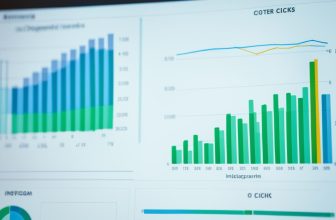Artificial intelligence (AI) has been making waves in various industries, and the music industry is no exception. With the help of AI music generators, musicians, composers, and producers can explore new creative possibilities and push the boundaries of music production.
AI music composition tools, software, and algorithms offer numerous benefits, including faster music production, more accurate melody and chord suggestions, and access to a diverse range of musical styles. By using AI, musicians can focus on the creative aspects of music-making while delegating repetitive or time-consuming tasks to the machines.
Key Takeaways
- AI music generators have revolutionized the music industry by offering new creative possibilities for musicians, composers, and producers.
- AI music technology includes composition tools, software, and algorithms that automate repetitive or time-consuming tasks, freeing up time for creative work.
- The benefits of using AI in music production include faster music creation, more accurate melody and chord suggestions, and access to a diverse range of musical styles.
Understanding AI Music Composition Tools
AI music composition tools are software applications that use artificial intelligence algorithms to generate music. These tools analyze massive datasets of existing music to identify patterns and create new compositions based on those patterns.
| Benefits of AI music composition tools | Examples of AI music composition tools |
|---|---|
|
|
Most AI music composition tools use machine learning algorithms such as neural networks to analyze and replicate musical patterns. These algorithms learn from a large dataset of existing music and can generate new compositions that are similar to the trained dataset.
AI music composition tools have gained popularity in recent years due to their ability to enhance and streamline the music creation process. They offer musicians and composers a new approach to creating music by enabling them to experiment with new sounds and compositions that they may not have thought of otherwise.
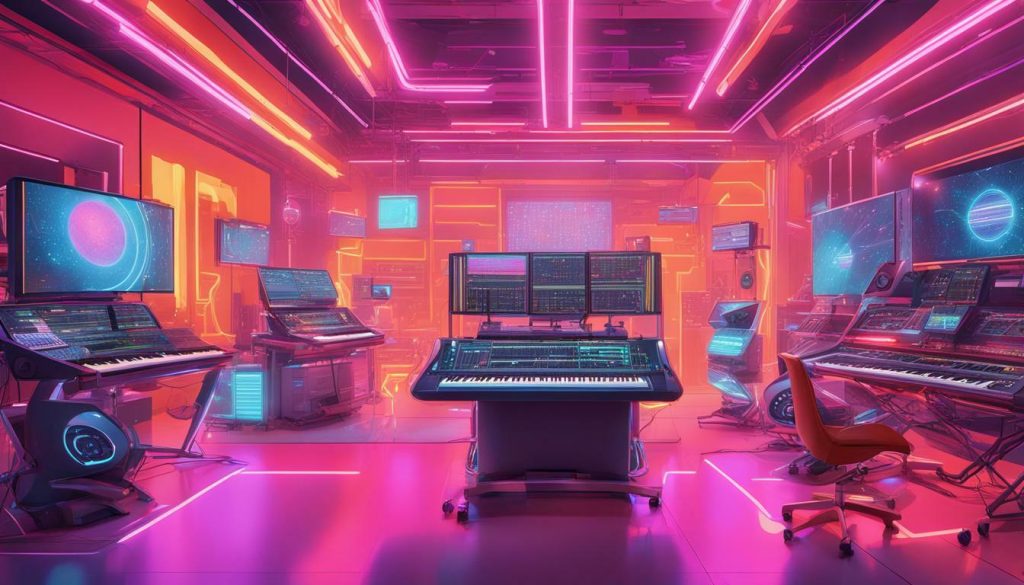
Understanding AI Music Composition Tools
“With AI music composition tools, musicians and composers have new ways of exploring their creativity by generating new and unique music compositions.”
The popularity of AI music composition tools is likely to continue as they improve and evolve through further technological advancements. In the next section, we will explore various AI music software available that have revolutionized music-making.
Exploring AI Music Software
AI music software is available in various forms, including standalone applications and plugins for popular digital audio workstations (DAWs). These programs use machine learning algorithms to analyze musical patterns and generate new ideas for music composition.
One popular AI music software is Amper Music, which allows users to create custom music for any project, with the click of a button. It offers a library of pre-recorded sounds and allows users to edit and adjust parameters, such as tempo and mood, to create unique music. Another AI music software is AIVA (Artificial Intelligence Virtual Artist), which uses deep learning algorithms to compose original music in a variety of genres and styles.
Plugins for major DAWs, such as Ableton Live and Logic Pro X, are also available. These plugins use AI technology to suggest chord progressions, melodies, and even entire song structures. For example, Captain Plugins is a suite of plugins that uses AI technology to suggest chord progressions and melodies in real-time, while Odesi is a standalone software that uses AI to suggest progressions, melodies, and basslines.
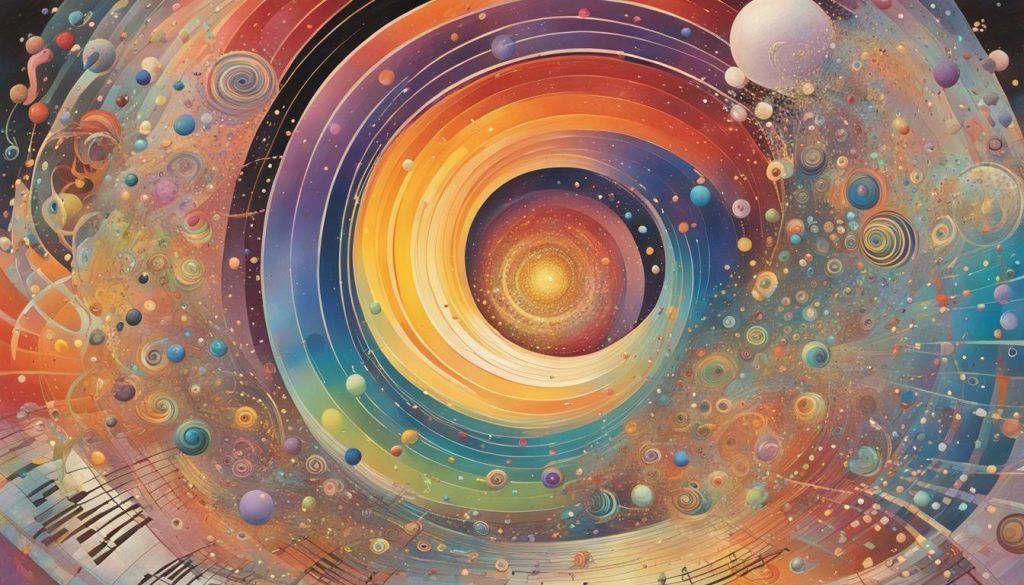
Aside from composition tools, AI music software can assist with other tasks in music production, such as mixing and mastering. For example, iZotope’s Neutron 3 uses AI algorithms to analyze audio data and suggest EQ settings, as well as providing AI-assisted mixing and mastering tools.
Creating Music with AI
One of the most significant benefits of AI in music creation is its ability to assist in generating new ideas and exploring different musical styles. AI can help musicians and composers break through creative blocks by suggesting new chord progressions, melodies, and harmonies based on existing musical patterns.
For instance, Amper Music is a popular AI music composition tool that allows users to create custom music tracks by simply selecting the desired style, tempo, and mood of the music. The tool’s machine learning algorithms then generate unique music compositions that can be further modified and customized by the user.
Another example of AI-assisted music creation is the album “Iamus,” which was entirely composed and performed by an AI system developed by researchers at the University of Malaga in Spain. The AI system used a set of algorithms based on the principles of swarm intelligence to generate complex musical pieces with multiple instruments and rhythms.
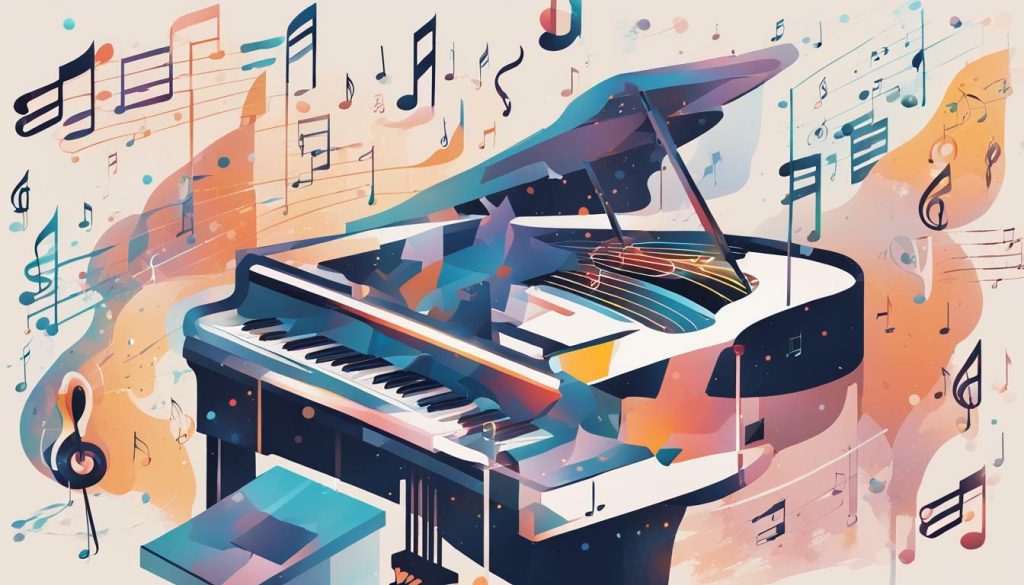
Image source: seowriting.ai
Moreover, AI can enhance compositions by suggesting changes that might not have been immediately apparent to the composer. For example, AI music software like AIVA can analyze a song and suggest changes in tempo, key, and instrumentation to create a more cohesive arrangement.
AI in music creation has also led to new genres and musical styles. Machine learning algorithms can analyze large datasets of musical genres and create hybrid styles that blend different elements from various genres. This approach has led to the emergence of exciting new sub-genres like AI-generated pop music and AI-generated ambient music.
AI in Music Production
The advent of AI has revolutionized the way music is produced. AI-powered tools are now capable of performing tasks such as audio mixing, mastering, and sound design, which previously required human expertise. AI algorithms can analyze and process audio data to improve the overall quality and efficiency of the production process.
One notable example of AI-powered music production is LANDR, an automated mastering tool that uses machine learning algorithms to analyze and enhance the sound of music tracks. Another example is AIVA, an AI-powered virtual composer that can generate original music in a variety of genres and styles.
However, there are some limitations to the use of AI in music production. While AI algorithms can improve the efficiency of certain tasks, they cannot replace the creativity and intuition of human producers. Nonetheless, the use of AI in music production is becoming more prevalent, and it is likely that AI-powered tools will continue to play an important role in the industry in the years to come.
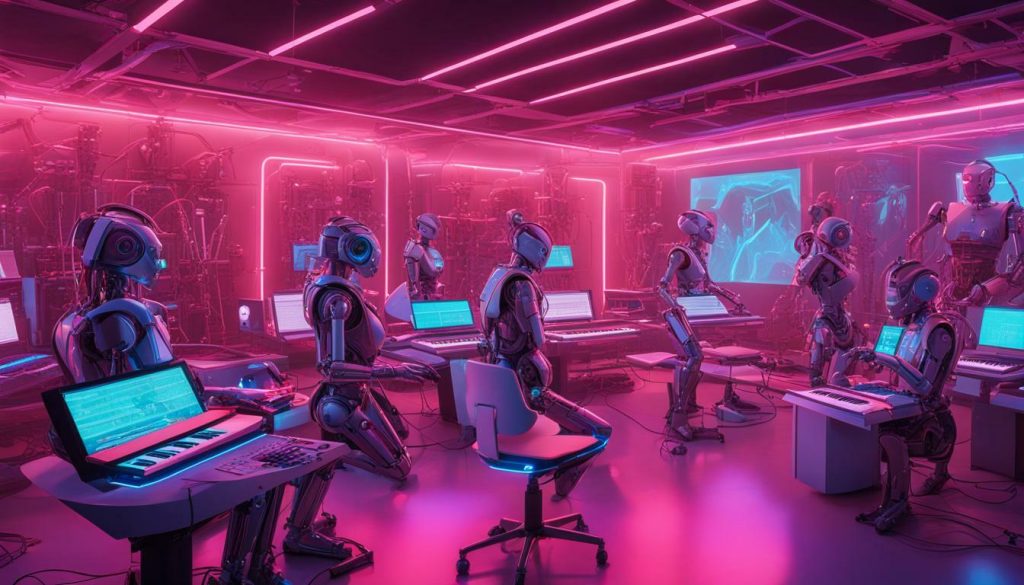
AI Music Generation Algorithms
AI music generation algorithms are the backbone of AI music generators. They use various mathematical and computational techniques to analyze and replicate existing musical patterns, and generate new ones. There are several approaches to AI music generation, each with its advantages and limitations.
Rule-based Systems
Rule-based systems are the oldest and simplest approach to AI music generation. They use a set of predefined rules to generate music. For example, a rule-based system may define a set of rules for melody generation, such as using certain scales, note lengths, and patterns.
While rule-based systems are easy to implement and understand, they lack the flexibility and creativity of other approaches. They are limited by the rules they are programmed with and are unable to learn and adapt to new musical styles.
Neural Networks
Neural networks are a more advanced approach to AI music generation. They use machine learning algorithms to analyze and learn from existing music data, and then generate new music based on that learning. Neural networks are trained with large datasets of music, and use statistical techniques to generate new musical patterns.
Neural networks are more flexible and creative than rule-based systems, as they are not limited by predefined rules. They can learn and adapt to new musical styles and generate more complex and varied music.
Genetic Algorithms
Genetic algorithms are another approach to AI music generation. They use evolutionary techniques inspired by nature to generate music. Genetic algorithms start with a set of random melodies and use techniques such as mutation and crossover to breed and evolve new melodies.
Genetic algorithms can produce highly diverse and creative music, but they require more computational resources and time to generate music compared to other approaches.
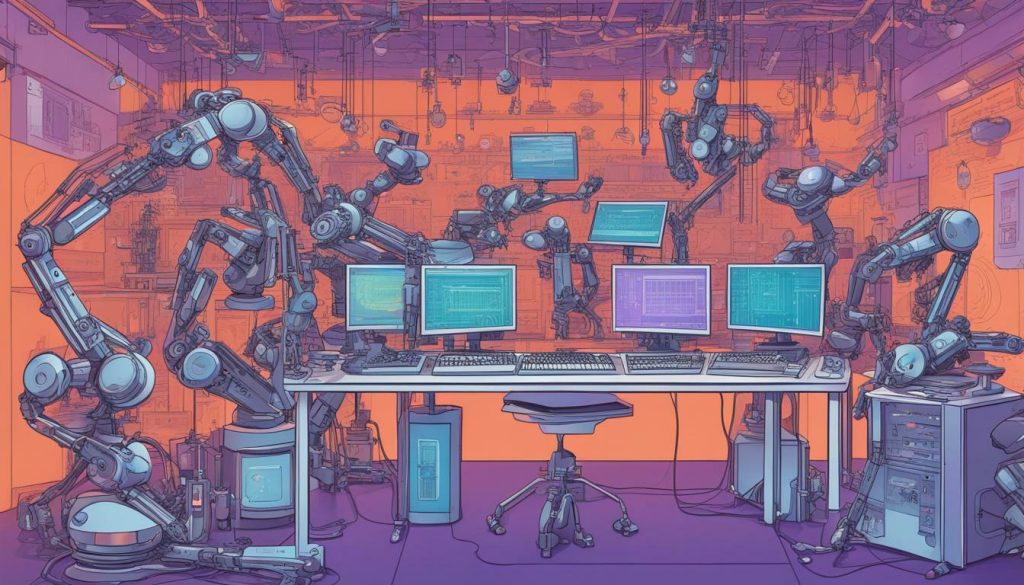
Each approach to AI music generation has its advantages and limitations. By combining different approaches and techniques, AI music generators can create a wide variety of musical styles and patterns. The diversity and creativity of AI-generated music continue to expand as new AI music algorithms are developed.
Advancements in AI Music Technology
The field of AI music technology has seen significant advancements in recent years, driven by breakthroughs in machine learning, deep learning, and natural language processing. These advancements have allowed AI music generators to produce music that is increasingly sophisticated and realistic, with a greater level of nuance and expression than ever before.
One of the key areas of development has been in the use of deep learning algorithms, which enable AI music generators to analyze and learn from large datasets of existing music. This has led to the creation of AI models that can generate music in a particular style or genre, or even mimic the unique sound of a particular artist or band.
Another area of innovation has been in the use of natural language processing (NLP) to generate lyrics or other textual elements of music. This has enabled AI models to create lyrics that are coherent and meaningful, with a level of creativity and emotional depth that was previously thought to be the exclusive domain of human songwriters.
Advancements in hardware and software have also played a significant role in the development of AI music technology. The increasing power of modern computers and the availability of specialized hardware, such as graphics processing units (GPUs), have enabled AI models to process and generate music more quickly and efficiently than ever before.
Overall, the advancements in AI music technology have opened up new possibilities for musicians, composers, and producers, allowing them to create music that is more imaginative, expressive, and engaging than ever before. As AI continues to evolve, there is no doubt that it will play an increasingly important role in the future of music production and consumption.
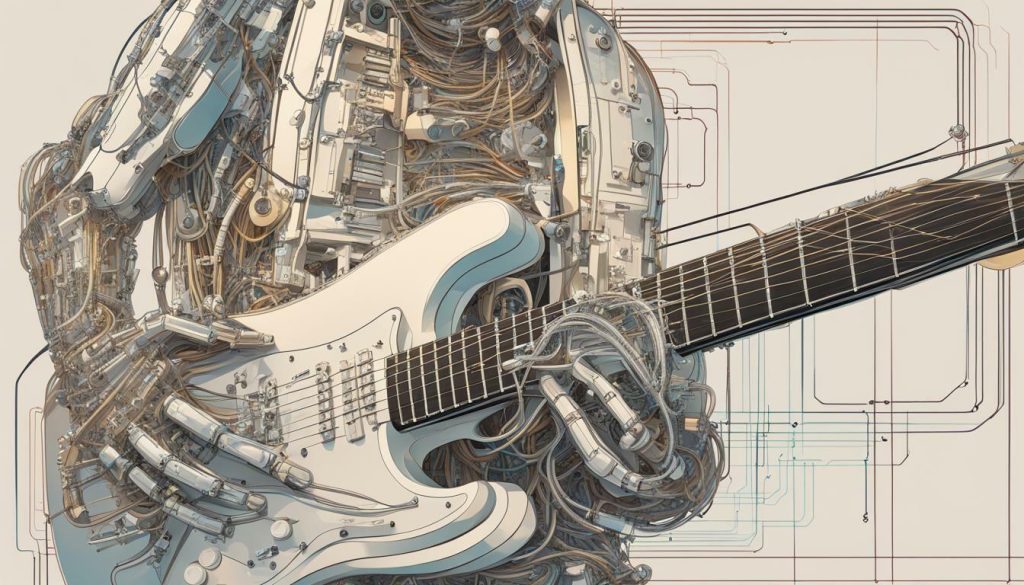
Conclusion
AI music generators are transforming the music industry and offering new possibilities for musicians, composers, and producers. By using AI music composition tools and software, musicians can generate new melodies, explore different musical styles, and enhance their compositions in ways never before possible.
The role of AI in music production is also expanding, with AI algorithms improving the quality and efficiency of tasks such as audio mixing, mastering, and sound design. Notable examples of AI-powered music production tools are becoming more prevalent in the industry.
Understanding AI music generation algorithms can help musicians appreciate the diversity of music that can be generated. Different approaches include rule-based systems, neural networks, and genetic algorithms, each with its own advantages and limitations.
Recent advancements in AI music technology, such as breakthroughs in machine learning, deep learning, and natural language processing, have improved the realism and capabilities of AI music generators. As this technology continues to evolve, the potential for new developments in the field is promising.
It is clear that AI music generators are here to stay, offering new opportunities and ways of creating music. Musicians, composers, and producers should explore the wide range of AI music composition tools and software available to enhance their creative process and take their music to new heights.
FAQ
Q: What are AI music generators?
A: AI music generators are tools or software that use artificial intelligence algorithms to compose or assist in the composition of music. These algorithms analyze patterns and structures in existing music to generate new melodies, harmonies, and rhythms.
Q: How do AI music composition tools work?
A: AI music composition tools use machine learning algorithms to analyze large datasets of music and identify patterns and relationships. They then apply these patterns to generate new musical ideas or assist in the composition process.
Q: What types of AI music software are available?
A: There are various types of AI music software available, including standalone applications and plugins for popular digital audio workstations (DAWs). These software offer features such as melody generation, chord progression suggestions, and automated arrangement tools.
Q: How can AI assist in music creation?
A: AI can assist in music creation by generating new ideas, exploring different musical styles, and enhancing compositions. It can analyze large amounts of music data to provide inspiration and help musicians and composers explore new creative avenues.
Q: What role does AI play in music production?
A: AI plays a role in music production by assisting in tasks such as audio mixing, mastering, and sound design. It uses algorithms to analyze and process audio data, improving the quality and efficiency of the production process.
Q: What are the algorithms used in AI music generation?
A: AI music generation algorithms can include rule-based systems, neural networks, and genetic algorithms. Each approach has its advantages and limitations, contributing to the diversity of AI-generated music.
Q: What advancements have been made in AI music technology?
A: Recent advancements in AI music technology include breakthroughs in machine learning, deep learning, and natural language processing. These advancements have improved the capabilities and realism of AI music generators, pushing the boundaries of what is possible in music composition.





